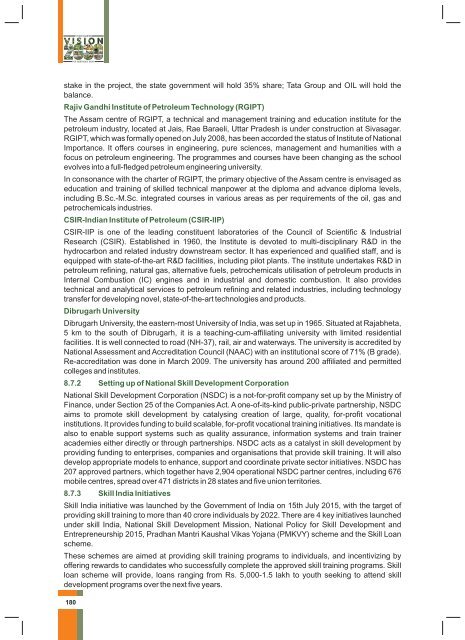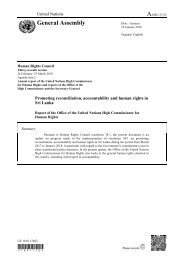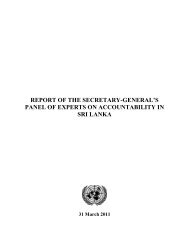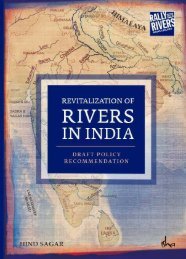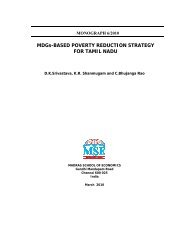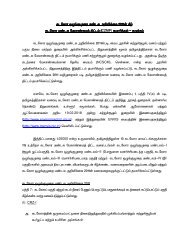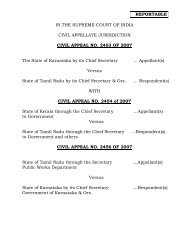Hydrocarbon Vision 2030 (ஹைட்ரோகார்பன் தொலைநோக்கு ஆவணம் 2030)
Create successful ePaper yourself
Turn your PDF publications into a flip-book with our unique Google optimized e-Paper software.
stake in the project, the state government will hold 35% share; Tata Group and OIL will hold the<br />
balance.<br />
Rajiv Gandhi Institute of Petroleum Technology (RGIPT)<br />
The Assam centre of RGIPT, a technical and management training and education institute for the<br />
petroleum industry, located at Jais, Rae Baraeli, Uttar Pradesh is under construction at Sivasagar.<br />
RGIPT, which was formally opened on July 2008, has been accorded the status of Institute of National<br />
Importance. It offers courses in engineering, pure sciences, management and humanities with a<br />
focus on petroleum engineering. The programmes and courses have been changing as the school<br />
evolves into a full-fledged petroleum engineering university.<br />
In consonance with the charter of RGIPT, the primary objective of the Assam centre is envisaged as<br />
education and training of skilled technical manpower at the diploma and advance diploma levels,<br />
including B.Sc.-M.Sc. integrated courses in various areas as per requirements of the oil, gas and<br />
petrochemicals industries.<br />
CSIR-Indian Institute of Petroleum (CSIR-IIP)<br />
CSIR-IIP is one of the leading constituent laboratories of the Council of Scientific & Industrial<br />
Research (CSIR). Established in 1960, the Institute is devoted to multi-disciplinary R&D in the<br />
hydrocarbon and related industry downstream sector. It has experienced and qualified staff, and is<br />
equipped with state-of-the-art R&D facilities, including pilot plants. The institute undertakes R&D in<br />
petroleum refining, natural gas, alternative fuels, petrochemicals utilisation of petroleum products in<br />
Internal Combustion (IC) engines and in industrial and domestic combustion. It also provides<br />
technical and analytical services to petroleum refining and related industries, including technology<br />
transfer for developing novel, state-of-the-art technologies and products.<br />
Dibrugarh University<br />
Dibrugarh University, the eastern-most University of India, was set up in 1965. Situated at Rajabheta,<br />
5 km to the south of Dibrugarh, it is a teaching-cum-affiliating university with limited residential<br />
facilities. It is well connected to road (NH-37), rail, air and waterways. The university is accredited by<br />
National Assessment and Accreditation Council (NAAC) with an institutional score of 71% (B grade).<br />
Re-accreditation was done in March 2009. The university has around 200 affiliated and permitted<br />
colleges and institutes.<br />
8.7.2 Setting up of National Skill Development Corporation<br />
National Skill Development Corporation (NSDC) is a not-for-profit company set up by the Ministry of<br />
Finance, under Section 25 of the Companies Act. A one-of-its-kind public-private partnership, NSDC<br />
aims to promote skill development by catalysing creation of large, quality, for-profit vocational<br />
institutions. It provides funding to build scalable, for-profit vocational training initiatives. Its mandate is<br />
also to enable support systems such as quality assurance, information systems and train trainer<br />
academies either directly or through partnerships. NSDC acts as a catalyst in skill development by<br />
providing funding to enterprises, companies and organisations that provide skill training. It will also<br />
develop appropriate models to enhance, support and coordinate private sector initiatives. NSDC has<br />
207 approved partners, which together have 2,904 operational NSDC partner centres, including 676<br />
mobile centres, spread over 471 districts in 28 states and five union territories.<br />
8.7.3 Skill India Initiatives<br />
Skill India initiative was launched by the Government of India on 15th July 2015, with the target of<br />
providing skill training to more than 40 crore individuals by 2022. There are 4 key initiatives launched<br />
under skill India, National Skill Development Mission, National Policy for Skill Development and<br />
Entrepreneurship 2015, Pradhan Mantri Kaushal Vikas Yojana (PMKVY) scheme and the Skill Loan<br />
scheme.<br />
These schemes are aimed at providing skill training programs to individuals, and incentivizing by<br />
offering rewards to candidates who successfully complete the approved skill training programs. Skill<br />
loan scheme will provide, loans ranging from Rs. 5,000-1.5 lakh to youth seeking to attend skill<br />
development programs over the next five years.<br />
180


